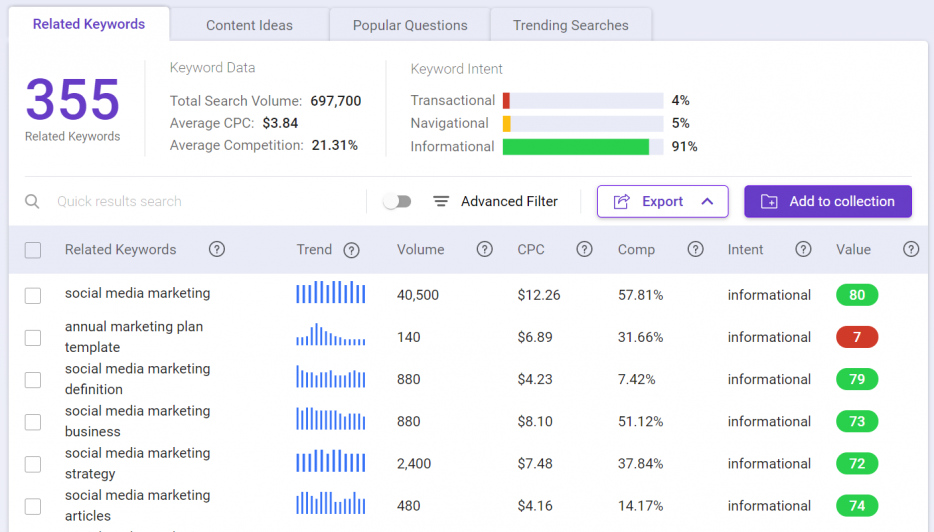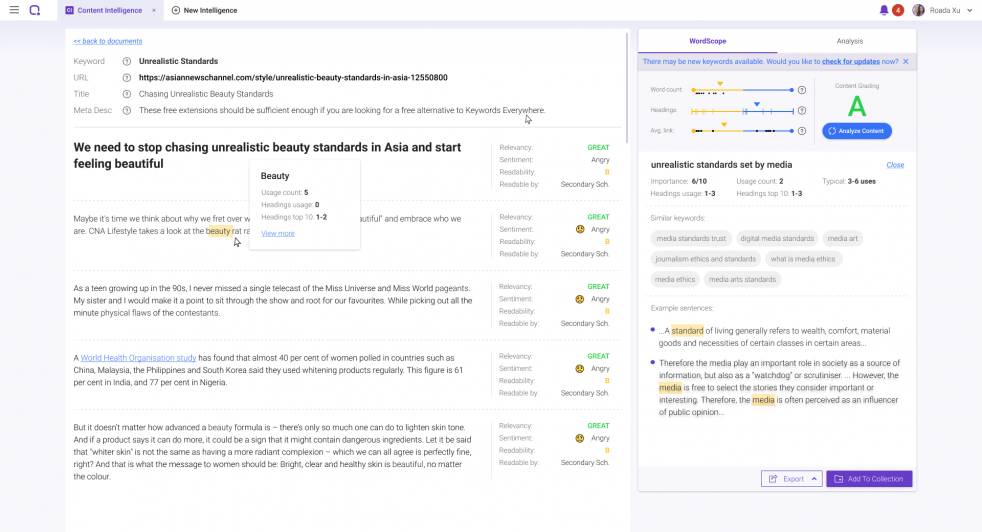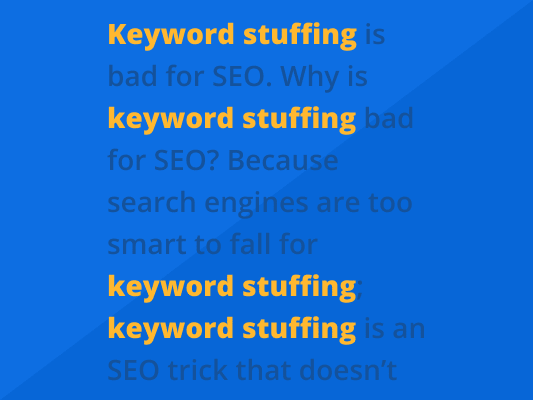Keyword stuffing is one of the oldest practiced forms of black hat SEO tactics. Avoid it at all costs while using your targeted keywords in your content. You want to focus on keyword optimization.
Back in the old days, content marketers could easily manipulate keyword stuffing on the search engine results pages.
Before, sites could use keyword stuffing to rank high in Google’s SERPs.
However, this led to a significant decrease in overall user experience for these websites.
Online users were not satisfied and felt tricked into seeing pages filled with keywords but not the contents they actually expected to see.
To improve user experience, Google and several other search engines started filtering out keyword-stuffed sites from their SERP index.
In all truth, this tactic has really helped brands that actually produce content for people to get the recognition they deserve.
While you may get away with keyword stuffing in the short term, Google eventually catches up with you and penalizes your website by demoting its rank.
The giant search engine may even decide to remove you from its search index completely.
Simply put, keyword stuffing is a very high-risk gambling approach that you’ll always end up losing.
Therefore, ensure you avoid it at all costs while at the same time using your targeted keywords throughout your content.
Sadly, most people fail to balance keyword optimization and stuffing keywords.
They end up getting penalized by Google.
What Is Keyword Stuffing?
Keyword stuffing is one of the oldest but still practiced forms of black hat SEO tactics.
It’s the practice of overloading a web page with keywords to manipulate that page’s rankings in the SERPs.
Although stuffing keywords doesn’t work anymore, it’s still considered an effective black hat SEO tactic.
Moreover, most online brands have been known to accidentally engage in this practice when building their SEO and end up doing more harm than good.
While sometimes keyword stuffing is an honest mistake, it can cost you your rankings in valuable search results.
This is something online businesses and brands value greatly.

That’s why it’s imperative that you learn about keyword stuffing and avoid it altogether.
In this post, we will provide you with a helpful and comprehensive guide on everything you must know about using keywords.
Keyword Stuffing Examples
By now, many organizations have turned their attention to SEO and the field of content creation.
These content creators may be keyword stuffing their web pages without even knowing and end up suffering unexpected consequences.
Here, we will provide you with keyword stuffing examples to help you understand what it is.

You can break down keyword stuffing in SEO into two main groups.
These are:
- Visible keyword stuffing
- Invisible keyword stuffing
Here’s a closer look at both types.
Visible Keyword Stuffing
In most cases, visible keyword stuffing is unintentional.
Say, for instance, a kitchen appliance brand uses the keyword “appliances” several times throughout their blog without even noticing.
The content creators might not know that they’re stuffing that particular keyword.
After all, when you read such posts, “appliances” are naturally bound to pop up several times.
However, if the same kitchen appliance brand uses the keyword “affordable kitchen appliances” throughout their posts, this will likely be intentional keyword stuffing.
Even visible overuse of keywords can occur in ways less obvious to the reader in an attempt to manipulate the SERPs.
Some websites do this by dumping extra SEO keywords in their footers.
Invisible Keyword Stuffing
On the other hand, savvy content marketers are smart enough to know they shouldn’t mess with online users’ experiences.
So, instead of simply forcing keywords in front of their eyes, thereby creating spammy and unreadable text, they hide the text.
How?

There are several ways content creators can hide spammy keywords from readers.
However, search engine crawlers can still identify such texts and use them to rank your web page.
Yes?
No!!
Sure, this used to be a trend back in the day.
And it worked for many websites.
For instance, content marketers could make the color of their texts and web page background the same.
This way, the user wouldn’t feel angered or distracted by the tens of unnecessary keywords copied and pasted within the web page.
Unfortunately, search engine crawlers could still identify them no matter their sizes, color, or style.
In simple terms, search engines could still identify these keywords and use them to index your web page.
Some website developers even went as far as to stuff keywords within their site’s HTML code.
These could be anywhere from the comments section to meta tags and alt tags where search bots would also find them.
Fortunately, Google and other search engine caught up with these keyword stuffing techniques and stopped them.
Today, none of these techniques hold any weight.
In fact, if Google realizes that you’re utilizing any of the above keyword stuffing techniques, it would penalize you heavily.
You may not even recover from it.
How To Avoid Keyword Stuffing
By this stage, we’ve already settled what keyword stuffing is and why you should avoid it at all costs.
Instead, you want to focus on keyword optimization and any other advice Google has to offer.
Essentially, creating useful, highly informative, and engaging content that has just the right amount of keywords in the context is the trick.
There’s no surer strategy for ranking high in the SERPs and increasing your site’s visibility.
Evidently, you still need keywords in your content.
So, don’t let this excerpt scare you to the point where you decide not to use them.
What we’re implying here is that you should use keywords in your content. But just remember to do so moderately.
Remember, you’re writing for people, not robots!
On that note, here are some quick pointers on what you can do to avoid keyword stuffing.
Perform Effective Keyword Research
This is perhaps the most important step to focus on.
Before you even start writing content, you must do in-depth research and find the right keywords for your content.
After all, you’ll still have to pass through this stage even when looking to spam your readers with keywords.
What’s the use of adding some low-value keywords to your web page and possibly end up suffering a penalty?
The alternative is performing in-depth research to find the perfect keywords and using them appropriately.
Do this right, and you’ll have sights for the top positions.
Moreover, your website will also be SEO-friendly, boosting your domain authority and site visibility.
In-depth SEO keyword research is critical for finding and using high-value keywords to make your content SEO-friendly.
BiQ’s Keyword Intelligence is among the best tools content marketers can use to conduct effective keyword research and organize keywords for easy access whenever you want to use them.

With Keyword Intelligence, you can find high-volume related keywords that online users are interested in.
This tool provides you with critical data and valuable insights like how many people are searching a particular keyword, the searcher’s intent, etc.
Avoid Incorrect Phrases
As a content creator, you can easily end up adding incorrect phrases to the content in your eagerness to add keywords that promote high Google keyword rankings.
For instance, “I’m driving car” isn’t correct.
You must add the article “a” after driving to make your sentence grammatically correct.
You always want to check for grammatical sentence errors before publishing content.
Even if your keyword density is at an acceptable level, using incorrect keyword phrases makes it more challenging to get your desired results from the blogs you post.
Increase The Word Count Of Your Content
Search engine results pages will likely give content more attention if it covers information in detail.
Therefore, if your post doesn’t have a lot of text, it’ll be more challenging to achieve this.
As a rule of thumb, most search engine providers favor longer pieces of content.
After all, you will have more room to sprinkle some of your relevant keywords and less room to overspin your web page.
According to the best SEO practices, you should work on creating content of at least 300 words.
If you write 1,000 words instead of 600 words, you’ll have more room to add keywords in the extra 400 words.
This way, you won’t have to force a keyword every 50 words or so.
Similarly, you should avoid adding fluff in a bid to add more words to your content.
Adding more words to your content allows Google and other search engines to notice it and rank it properly.
But that’s if the blog post is informative and provides value to your readers.
Maintain A Good Keyword Density
Keyword stuffing in SEO is considered treasonous and a sure way to kill your content marketing career.
And that’s not even the half of it.
Your web page ranking will suffer tremendously.
Albeit, Google may even decide to remove your website from its ranking index completely.
But how many keywords in your content is too many for your written piece?
Although the keyword density guidelines are more flexible, the best practices suggest that you stick to the optimal keyword density, which is anywhere between 2% and 5%.
This range is considered safe by most search engines.
BiQ’s Content Intelligence provides users with the best content-driven strategies that are SEO-focused.

Ideally, you’ll have more leeway to use BiQ’s Content Intelligence feature to get relevant data in real-time aimed at improving your overall content grade.
With Content Intelligence, you can make necessary edits and iron out any blocks that are preventing your website from ranking high on the SERPs.
Use Synonyms And Long-Tail Keywords
Did you know that you can actually help search engines to your content?
It’s all about your target keyword!
And yes, you can use secondary keywords to reinforce your authority and ownership of your target keyword.
The same is also true for synonyms and long-tail keyword variations in your content.
Your use of synonyms and long-tail keywords in your content gives Google additional content and proof of your main topic.
Not only do synonyms and long-tail keywords provide you with more content to work with, but they also let Google know what questions your content aims to answer.
If so, then your content may find its way in Google’s coveted “People also ask” section.
Essentially, there are several reasons why you should use long-tail keywords in your content.
You can use BiQ’s Keyword Intelligence to filter any long-tail keywords if you are unsure about which keywords to use based on volume and keyword value.
Higher valued keywords will potentially bring home more traffic at a lower competition.
Simply click the Keyword Intelligence “Advanced Filter” in BiQ Cloud to check the level of long-tail keyword relatedness to your target keyword.
This way, you will have the best target keywords and long-tail keywords and know how best to apply them in your blog post.
Add Target Keywords To Your Page Elements
Another critical feature to consider that search engines love is to optimize your web page for particular keywords.
This is done by adding the target keyword to all the right places throughout your page elements.
These can include:
- Page titles
- Title tags
- Beginning and ending of texts
- Subheadings
- Image alt tags
- Meta descriptions.

Your primary objective here is to optimize your post with the right amount of keywords that have been strategically placed within your page elements.
Doing this tells the SERPs exactly what your page is about so that they easily understand your content’s topic and know how best to rank your web page.
Adding target keywords in the right places enables you to fully optimize your web page, which will boost your search rankings and visibility.
Conclusion
Our lesson here is simple.
As a content creator and marketer, your job is to write informative, interesting, and engaging content for your readers, not the search engines.
As such, natural language is vital for delivering your ideas.
But it’s something most writers take for granted.
You can only do this by avoiding the keyword stuffing practices mentioned above.
Nothing good comes from using them.
Instead, you want to pursue higher rankings in organic search and deliver an amazing user experience for your readers.
BiQ Cloud is the best SEO tool you can use to ensure your content is keyword-optimized.
Tell me about your writing experience.
Have you ever over-stuffed your keywords?




